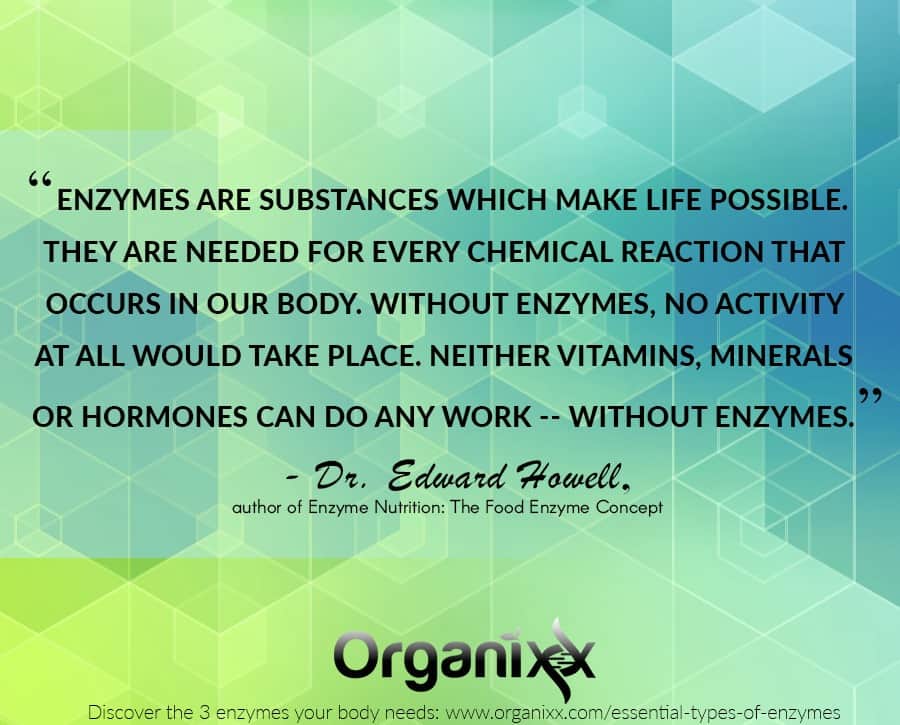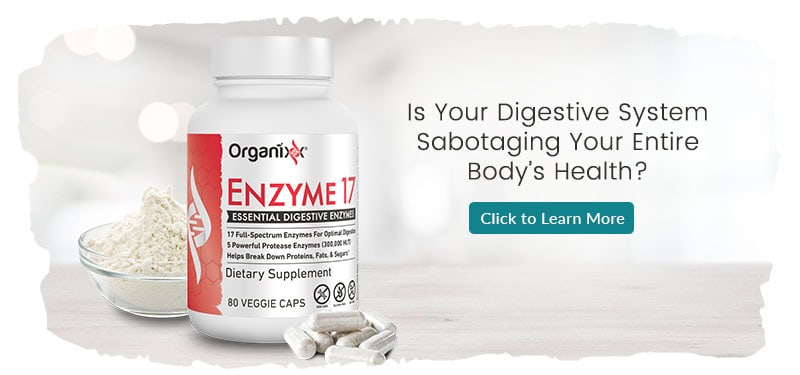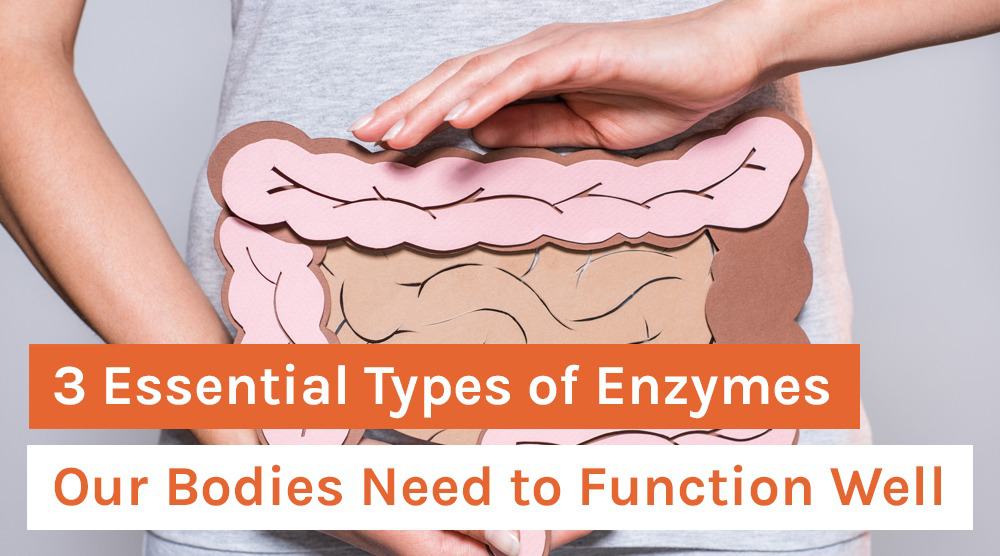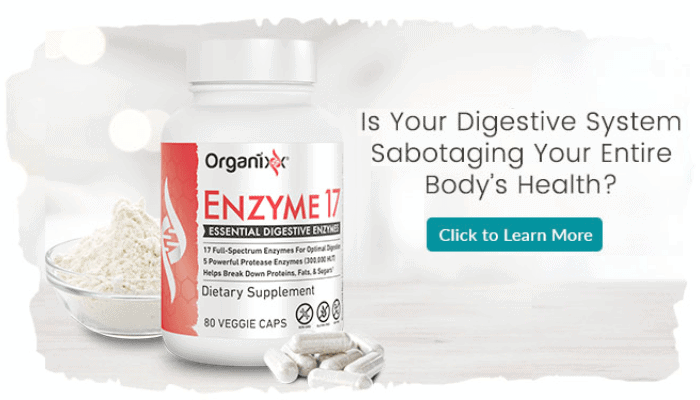3 Essential Types of Enzymes Our Bodies Need to Function Well
In a hurry? Click here to read the Article Summary...
Your body is equipped in many ways to handle the foods you put into it. But your body also relies on food itself to meet it halfway in furnishing certain conversion elements.
These elements pre-digest that food and extract its nutrients. They also deliver these nutrients to areas throughout the body where they’re needed. These conversion elements are known as enzymes, and they’re the foundation upon which human life exists.
The reason why these enzyme reserves are so important is that every biochemical process that takes place inside the body only occurs because of enzymes. Enzymes ensure that each piece of the vast molecular puzzle that makes up our bodies is functioning as it should, as well as interacting with all the other pieces in sustained congruence.
You can think of enzymes as a type of “micro miracle” that necessitates life as we see it animated in the human form.
The Good News/Bad News About Enzymes
 The good news is that the human body is designed to produce its own enzymes to aid in the food digestion process. It also has the ability to compensate for whatever enzymes are lacking in processed or otherwise enzyme-deficient foods – at least for a time. This is where the bad news comes into play…
The good news is that the human body is designed to produce its own enzymes to aid in the food digestion process. It also has the ability to compensate for whatever enzymes are lacking in processed or otherwise enzyme-deficient foods – at least for a time. This is where the bad news comes into play…
The fact of the matter is that the body is limited in the quantity and types of enzymes that it can produce for supplemental purposes beyond what it was originally designed to handle.
When the foods a person eats are persistently lacking in native enzymes, in other words, the body will eventually exhaust its own enzyme reserves.
What Happens When Food Lacks Essential Enzymes?
Enzymes are important for digestion – the primary way that our bodies obtain vital nutrients from the foods we eat. Enzymes are absolutely crucial if you want to live a long and healthy life, in fact, which is why you need to make sure that you’re getting enough of them.
Let’s take a closer look at the three primary types of enzymes that your body needs:
- Food enzymes – occur naturally in raw food. Their job is to begin pre-digesting food in the upper stomach; a process that takes between 30-45 minutes after eating.
- Digestive enzymes – are manufactured by the body to further break down this pre-digested food and deliver its nutrients through the gut wall and into the bloodstream.
- Metabolic enzymes – are also produced by the body, and perform various other important functions throughout the body such as cell tissue repair, waste cleanup, and even destruction of harmful cells.
Each class of enzyme is designed to perform its own unique set of functions to keep your body going strong. Together, this enzymatic trio is what sustains overall health and well-being – serving as the basis of life itself.

But what happens when one piece of this enzyme mosaic is thrown out of balance, such as when otherwise enzymatically-dense foods are cooked or processed?
Many people don’t know this, but enzymes are extremely delicate and volatile, despite their incredible importance and amazing abilities. When exposed to heat, even at extremely low temperatures of as little as 118 degrees Fahrenheit (48 degrees Celcius), enzymes in food quickly begin to die off in very high numbers.
Enzymes are also unable to withstand the types of processing that lands food in shelf-stable packages, boxes, and cartons. For many people, this is a very large percentage of what they eat on a daily basis.
Such heated and processed food, stripped of its  enzymes, is categorically speaking: dead. This means that the body has to offset the problem by producing extra enzymes to help digest this dead food before attempting to send its nutrient components into the small intestine for absorption.
enzymes, is categorically speaking: dead. This means that the body has to offset the problem by producing extra enzymes to help digest this dead food before attempting to send its nutrient components into the small intestine for absorption.
This is a difficult process that puts immense strain on vital organs like the pancreas that already have the responsibility of manufacturing enzymes for other purposes such as cellular tissue repair, toxin elimination, and waste removal.
While your body is equipped to adapt to problems like this in order to offset them, it can only do so for a limited time. The fact of the matter is that enzyme production potential and stores gradually diminish the longer the body has to overcompensate for enzyme deficiency in food.
This creates a situation where either food is no longer being fully and properly digested, or the rest of the body isn’t getting the enzymes it needs to repair tissue and clean up waste.
In some cases, both scenarios occur at the same, creating the ultimate recipe for a health disaster.
One of the most obvious symptoms of enzyme deficiency in your diet is poor digestion. If you often feel bloated or gassy after eating a meal, for instance, or experience abdominal discomfort on a regular basis, chances are you aren’t getting enough enzymes.
Organixx Enzyme 17 contains a whopping FIVE kinds of powerful protease enzymes in combination with one of the most advanced enzyme blends on the planet. It’s scientifically designed to help your body break down and process nutrients for better absorption, digestion, and overall health.

 Sources:
Sources:
Article Summary
The body is limited in the quantity and types of enzymes that it can produce for supplemental purposes.
Enzymes are important for digestion.
Food enzymes occur naturally in raw food. Their job is to begin pre-digesting food in the upper stomach; a process that takes between 30-45 minutes after eating.
Digestive enzymes are manufactured by the body to further break down this pre-digested food and deliver its nutrients through the gut wall and into the bloodstream.
Metabolic enzymes are also produced by the body and perform various other important functions throughout the body such as cell tissue repair, waste cleanup, and even destruction of harmful cells.





There are no bile salts in this particular digestive enzyme. People with no gallbladder need bile salts with their digestive enzymes to work more efficiently.
Hello! I noticed Enzyme 17 has parts of Aspergillus niger, a fungus, in it. Could you explain how those components are changed, if so, so that the fungus becomes non-invasive in our body?
Hi Sylvia, Thank you for your question. Aspergillus Niger is naturally occurring. It can be harmful in large quantities. However, aspergillus niger can be extremely helpful in small quantities. This fungus has proven to be useful for production of digestive enzymes for humans and animals. It is used in it's enzymatic form which aids in protein digestion and absorption. The process of extracting the enzymes from aspergillus niger occurs through a fermentation process. I hope you find this information helpful. Have an awesome day!
Please consider an enzyme blend suitable for vegans! I have contacted your customer service team in regards to this item and they told me it is vegetarian, but not vegan. I was bummed because I ordered the Best Wellness Kit and I had to give a few items away because I can't take the products that aren't vegan. Just a thought so you can help more people! :)
Thank you for your meaningful suggestion, Jess! Our team is always open to developing products that are inclusive to all of our customers with unique dietary requirements and health conditions, so we truly appreciate your feedback.
I actually have a question Can you list those necessary enzymes, the part they play and from where we get them? Thank youl
Ginger pickle lemon juice ginger chopped chew before meal